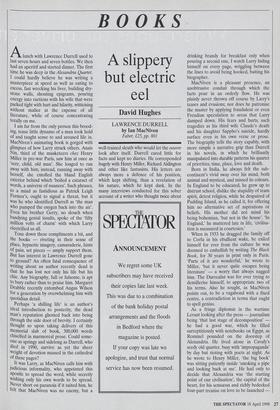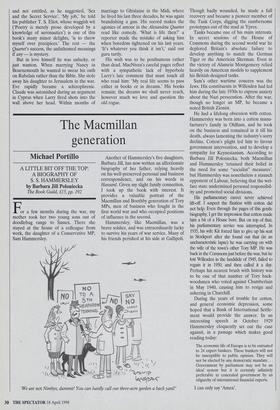BOOKS
A slippery but electric eel
David Hughes
LAWRENCE DURRELL by Ian MacNiven Faber, f25, pp. 801 Alunch with Lawrence Durrell used to last seven hours and seven bottles. We then had an aperitif and started dinner. The first time he was deep in the Alexandria Quartet. I could hardly believe he was writing a masterpiece at speed as well as eating to excess, fast wrecking his liver, building dry- stone walls, shouting epigrams, pouring energy into ructions with his wife that were packed tight with hurt and hilarity, witticising without malice at the expense of all literature, while of course concentrating totally on me.
I am far from the only person this brood- ing, tense little dynamo of a man took hold of and taught sense to and aroused life in. MacNiven's animating book is gorged with glimpses of how Larry struck others. Anals Nin, third of the musketeers chez Henry Miller in pre-war Paris, saw him at once as `seer, child, old man'. She longed to run away with him; instead, running away with herself, she extolled the bland English exterior behind which 'boiled a cataract of words, a universe of nuances'. Such phrases, to a mind as fastidious as Patrick Leigh Fermor's, ought to signal a threat, but it was he who identified Durrell as 'the man who pumped the oxygen back into the air'. Even his brother Gerry, no slouch when bandying genial insults, spoke of the 'fifty million volts of charm' with which Larry electrified us all.
Tone down these compliments a bit, and the books — riveting in their sense of place, hypnotic imagery, camaraderie, hints of pain, set pieces — amply support them. But has interest in Lawrence Durrell gone to ground? An often fatal consequence of writing about an author recently dead is that he has lost not only his life but his chic. Any biography, full or fulsome, is apt to bury rather than to praise him, Margaret Drabble recently entombed Angus Wilson for a generation by overwhelming him with quotidian detail.
Perhaps 'a shilling life' is an author's ideal introduction to posterity, the dead man's reputation ghosted back into being through the side door of brevity. I certainly thought so upon taking delivery of this memorial slab of book, 300,000 words chiselled in marmoreal prose. Could some- one as springy and sidelong as Durrell, who died in 1990, survive as yet the sheer weight of devotion massed in the cathedral of these pages? It was Larry, as MacNiven calls him with judicious informality, who appointed this apostle to spread the word, while secretly wishing only his own words to be spread. Never short on paranoia if it suited him, he felt that MacNiven was no enemy, but a well-trained sleuth who would let the oeuvre look after itself. Durrell cared little for facts and kept no diaries. He corresponded hugely with Henry Miller, Richard Aldington and other like fantasists. His letters are always more a defence of his position, which kept shifting, than a revelation of his nature, which he kept dark. In the many interviews conducted for this sober account of a writer who thought twice about drinking brandy for breakfast only when pouring a second one, I watch Larry hiding himself on every page, wriggling between the lines to avoid being hooked, baiting his biographer.
MacNiven is a pleasant presence, an unobtrusive conduit through which the facts pour in an orderly flow. He was plainly never thrown off course by Larry's teases and evasions; nor does he patronise the master by applying fraudulent or even Freudian speculation to areas that Larry damped down. His fears and hurts, such tragedies as his third wife Claude's death and his daughter Sappho's suicide, hardly surface even in his own verse or prose. The biography tells the story capably, with more simple a narrative grip than Durrell in his novels, in which he brilliantly manipulated into durable patterns his quartet of priorities, time, place, love and death. Born in India, he always felt the sub- continent's vivid sway over his mind, both animal and mystical, and missed its colours. In. England to be educated, he grew up to distrust school, dislike the stupidity of team spirit, detest religion, while he despaired of Pudding Island, as he called it, for offering him no alternative set of aspirations or beliefs. His mother did not mind his being bohemian, 'but not in the house'. 'In England,' he muttered late in life, 'civilisa- tion is measured in courtesies.'
When in 1933 he dragged the family off to Corfu in his ebullient wake, he exiled himself for ever from the culture he was doomed to embellish by writing The Black Book, for 30 years in print only in Paris. `Parts of it are wonderful,' he wrote to Miller, 'but it never quite escapes being literature' — a worry that always nagged him. The Durrealist was for ever trying to demillerise himself, to appropriate two of his terms. Also he sought, as MacNiven points out, to be a vagabond with a fixed centre, a contradiction in terms that ought to spell genius.
As a fringe diplomat in the wartime Levant looking after the press — journalism being 'that last stage of decomposition' he had a good war, which he filled surreptitiously with notebooks on Egypt, as Rommel pounded on the doorstep of Alexandria. He lived alone in Cavafy's seedy old quarter, busy with 'impropaganda' by day but rioting with poets at night. As he wrote to Henry Miller, 'the big book' was sitting patiently inside 'smoking a pipe and looking back at me'. He had only to decide that Alexandria was 'the starting point of our civilisation', the capital of the heart, for his sensuous and richly bedecked four-part treatise on love to be launched — and not entitled, as he suggested, 'Sex and the Secret Service'. 'My job,' he told his publisher T. S. Eliot, whose waggish wit (Poetry is merely prose developed by a knowledge of aeronautics') is one of this book's many minor delights, 'is to throw myself over precipices.' The rest — the Quartet's success, the unfathomed meanings if any — is mystery.
But in love himself he was unlucky, or just wanton. When marrying Nancy in Bournemouth he wanted to swear his oath on Rabelais rather than the Bible. She stole away his daughter to Jerusalem in the war. Eve rapidly became a schizophrenic. Claude was astonished during an argument in Cyprus when Larry fired shots into the wall above her head. Within months of marriage to Ghislaine in the Midi, where he lived his last three decades, he was again brandishing a gun. His record makes the agonies of amour in the Alexandria Quartet read like comedy. 'What is life then?' a reporter made the mistake of asking him when boredom tightened on his last years. `It's whatever you think it isn't,' said our guru tartly.
His wish was to be posthumous rather than dead. MacNiven's careful pages reflect with a sympathetic lack of hyperbole Larry's late comment that must touch all who read him: 'My real life seems to pass either in books or in dreams.' His books remain; the dreams we shall never reach, however much we love and question the old rogue.



























































 Previous page
Previous page